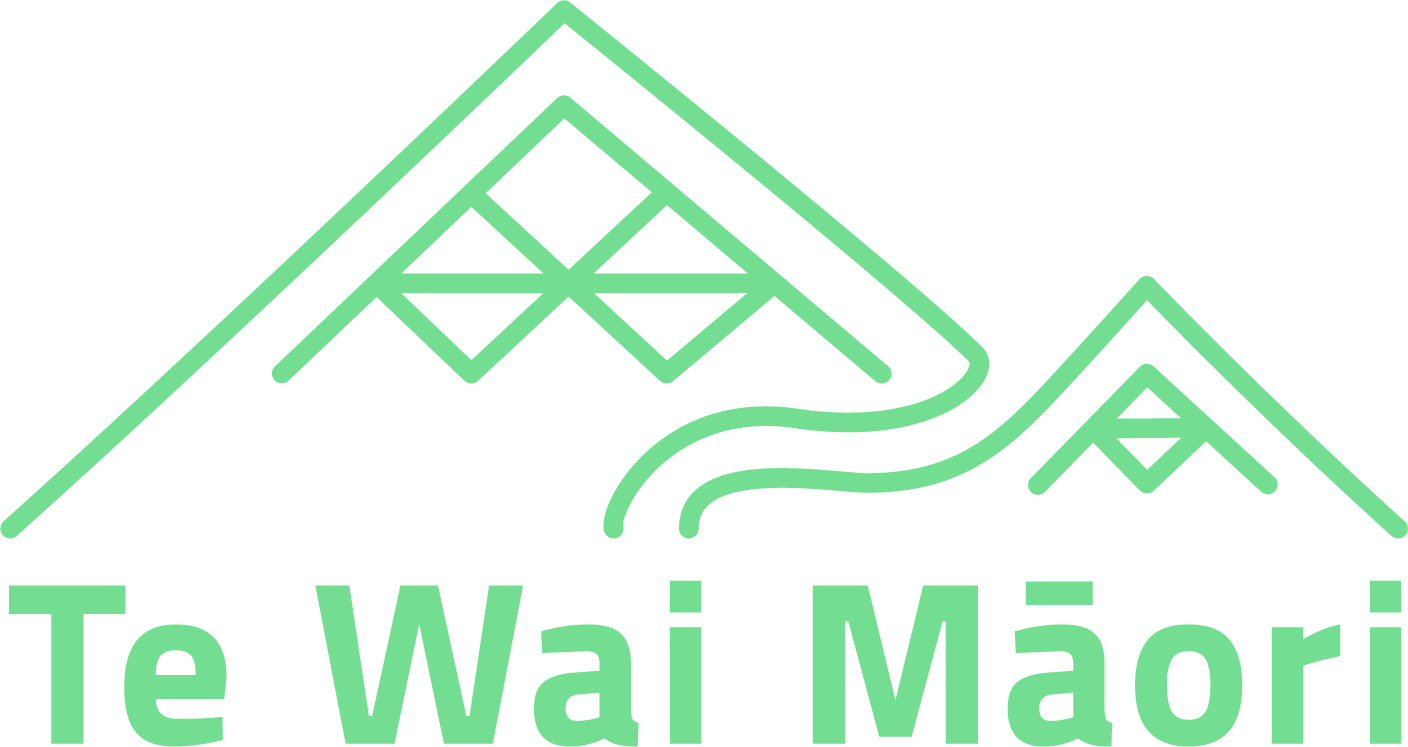Māori Freshwater Fisheries Conference
16 – 17 November 2023
Building upon the energy and inspiration from our hui in Taupō in 2022, the 2023 Māori Freshwater Fisheries Conference was held in Wakatū. Over 230 kaitiaki wai māori gathered under the kaupapa of He Waimāreparepa’ – creating tomorrow for our mokopuna through ripples in the water.
Even the lightest touch to the water’s surface creates far-reaching ripples. What will our mokopuna inherit as a result of our efforts to protect our wai and taonga?
He Waimāreparepa looked to the future and brought together kaikōrero to explore how an intergenerational lens casts a stone into the water and reflects the way we engage with our indigenous fisheries and their habitat.
Presentations
We had an amazing variety of kaikōrero over two-days. You’ll find a few of the presentations from our conference below, and all of the presentations from our previous conference on our YouTube channel.
Photos
Featured Kaikōrero
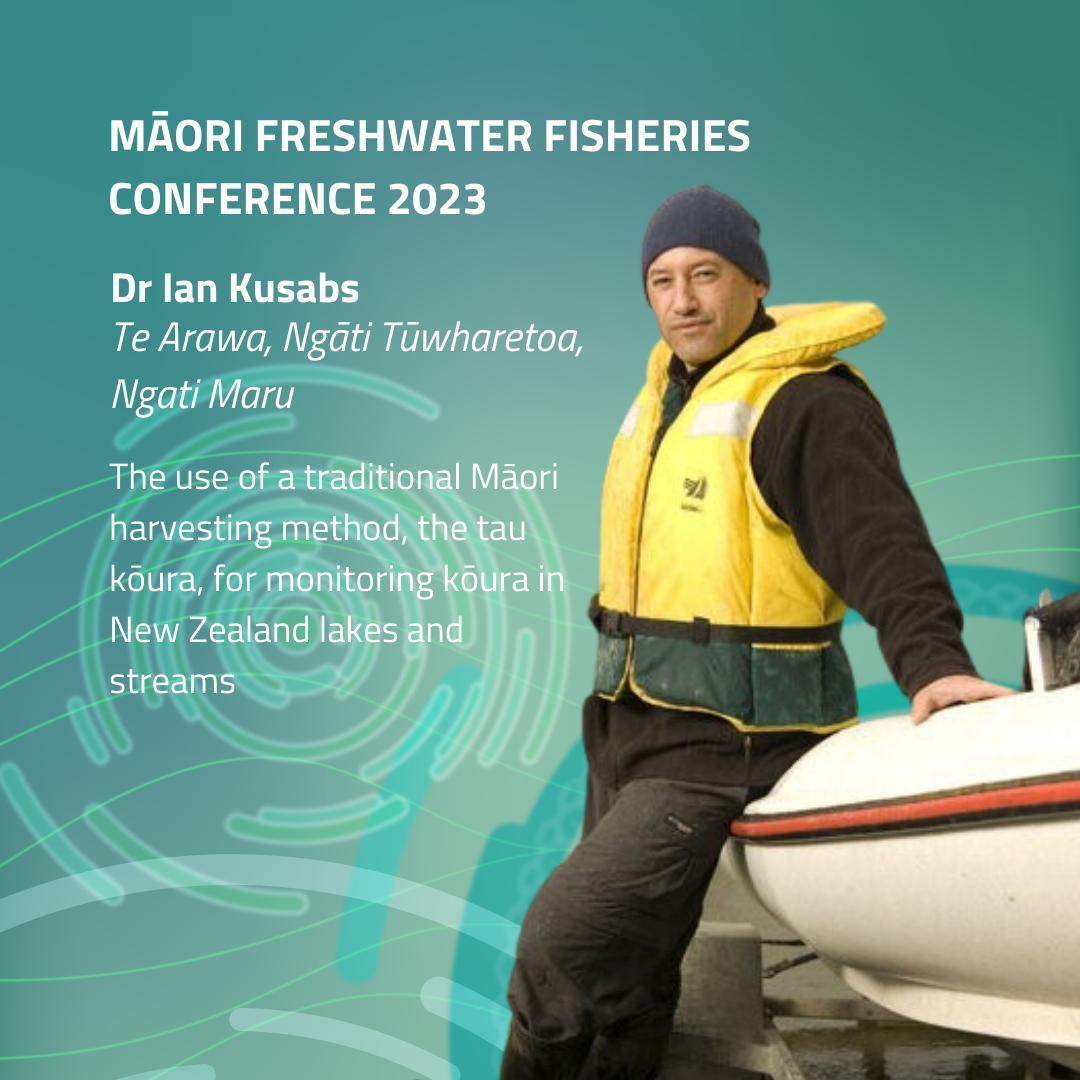
Dr Ian Kusabs
Te Arawa, Ngāti Tūwharetoa, Ngāti Maru
The use of a traditional Māori harvesting method, the tau kōura, for monitoring kōura in New Zealand lakes and streams
Dr Ian Kusabs is principal of his own consultancy specialising in freshwater fisheries incorporating Mātauranga Māori & science knowledge systems. He is of Te Arawa and Ngāti Tūwharetoa descent and is a freshwater advisor to the Te Arawa Lakes Trust. Ian is a self-employed freshwater fisheries biologist with more than 25 years’ experience in freshwater fisheries consultancy, management and research. He is the senior representative of the Rōpū Māori on the NZ Freshwater Sciences Society and a member of the International Association of Astacology. Ian is an honorary lecturer at the University of Waikato (Department of Science & Engineering).
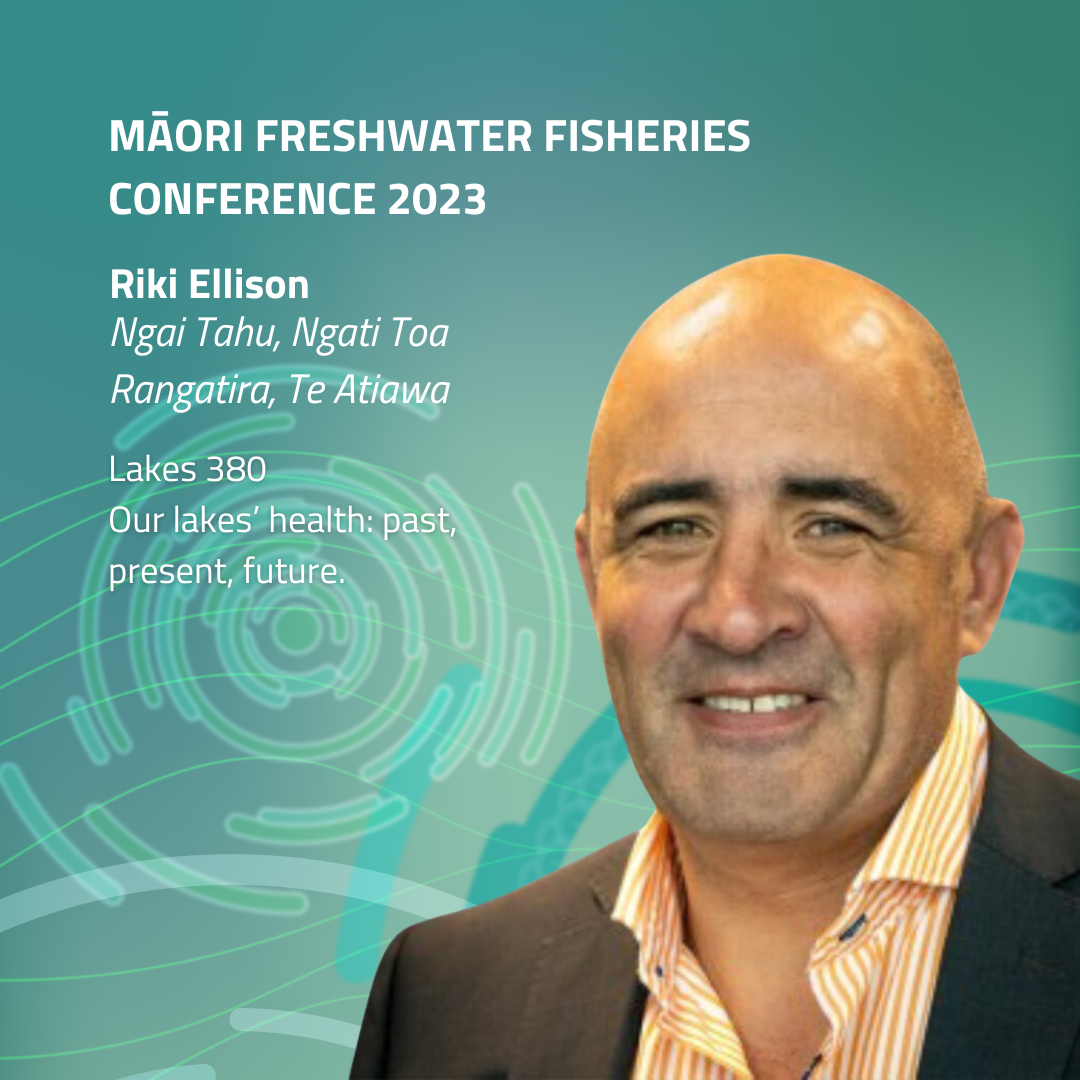
Riki Ellison
Ngai Tahu, Ngati Toa Rangatira, Te Atiawa
Lakes 380 Our lakes’ health : past, present, future. Me hoki whakamuri, kia haere whakamua.
Riki will share his experiences and some of the learnings from the Lakes 380 research project. Lakes 380 is utilising water, bottom sediment and sediment cores from about 380 lakes across Aotearoa to determine the current and historic (circa 1000 years) health of our lakes.
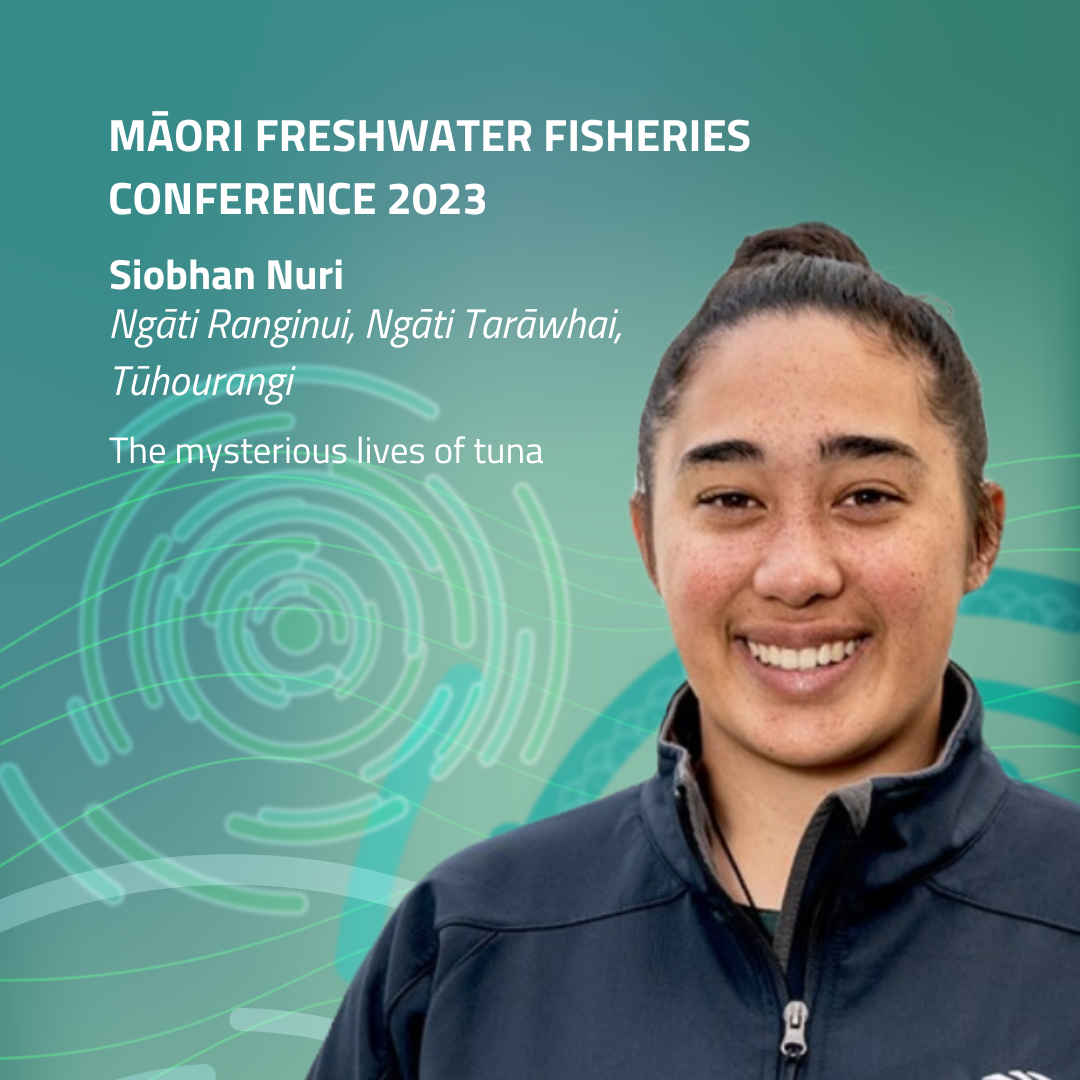
Siobhan Nuri
Ngāti Ranginui, Ngāti Tarāwhai, Tūhourangi
The mysterious lives of tuna
Siobhan is a PhD candidate at the University of Waikato. Her rangahau looks at providing insights into the poorly understood early life histories of longfin and shortfin tuna in Aotearoa, specifically focussing on the Rangitāiki River and involving close collaboration with iwi and local communities. Siobhan has previously helped to investigate kākahi monitoring methods and contributed to the understanding of heavy metal accumulation in kōura for iwi freshwater fisheries.
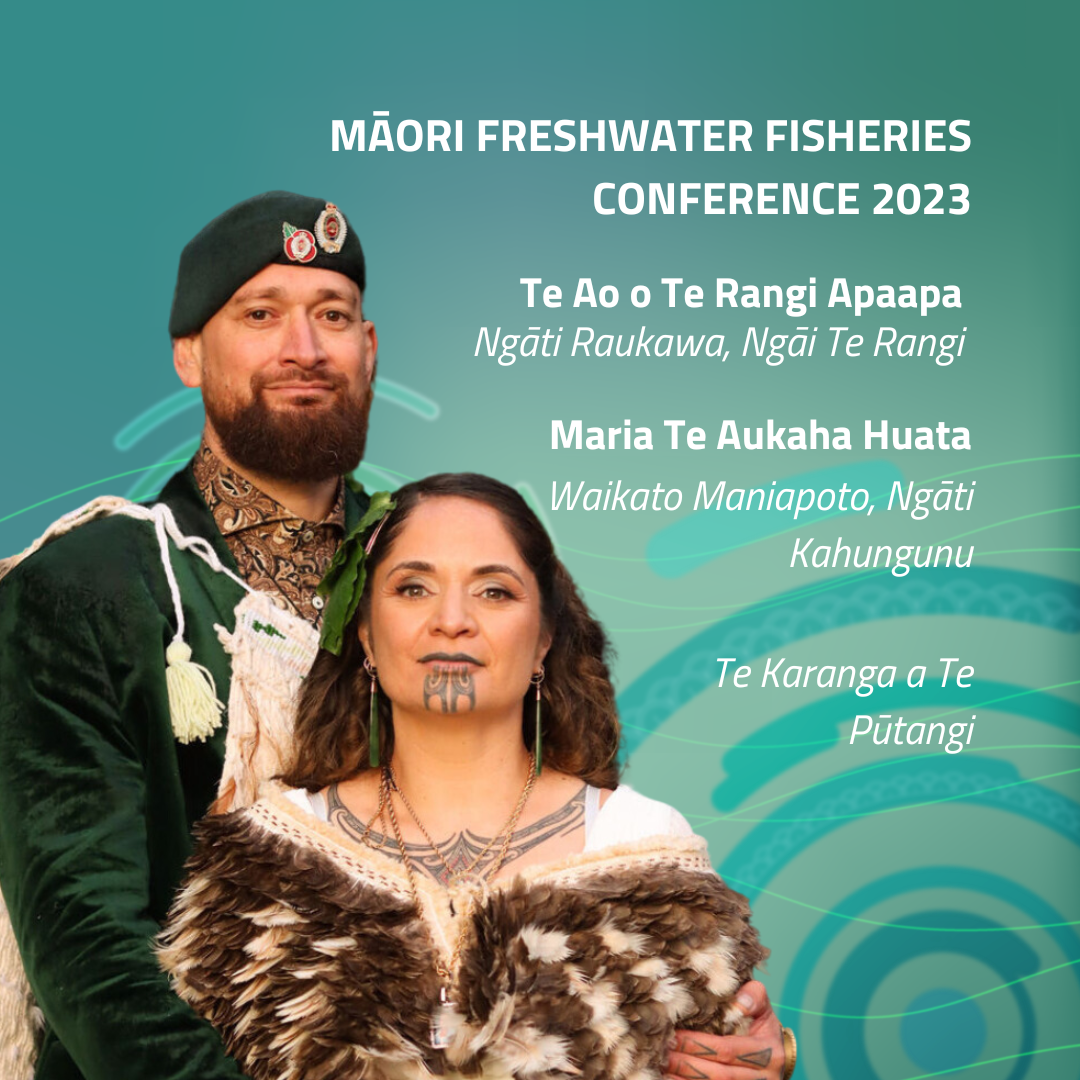
Te Ao o Te Rangi Apaapa and Maria Te Aukaha
Ngāti Raukawa, Ngāi Te Rangi & Waikato Maniapoto, Ngāti Kahungunu
Te Karanga a te Pūtangi
Husband and Wife duo Te Ao o Te Rangi Apaapa and Maria Te Aukaha Huata have been working alongside a skilled team of environmental, scientific, legal, Te Ao Māori, Te Reo Māori and Tikanga Māori experts for six years to stop quarrying on Te Weraiti to restore the mana and wellbeing of the whenua, wai and uri of Tangata. In 2022 ‘Te Karanga a Te Pūtangi’ was established as a continuation of this plight.
Te Ao o Te Rangi is the ‘brains and brawn’ of the kaupapa and Maria Te Aukaha is the ‘heart and hands’. Te Ao o Te Rangi served in the military for thirteen years, managed youth leadership programmes, graduated with his Bachelor of Arts majoring in Psychology from Massey Univeristy in 2020 and now works for the New Zealand Landcare Trust as the Mātauranga Māori Facilitator for the ‘Taiea te Taiao’ restoration of the ecological corridor between Pirongia Te Aroaro o Kahu and Maungatautari mountains project.
Maria Te Aukaha comes from a whānau steeped in education who are all staunch advocates and champions for Te Reo Māori and Te Ao Māori whānui. Maria Te Aukaha holds a Master of Arts from The University of Waikato majoring in Māori and Pacific Development and alongside her twin sister Pania Marino graduated from Te Panekiretanga o Te Reo under the mantle of Tā Tīmoti Kāretu and Tā Pou Temara in 2019. Her current role is with Waikato Tainui as a Multi Media Producer.
Together Te Ao o Te Rangi and Maria Te Aukaha created their own little iwi ko Te Aukaha o Te Rangi sharing eleven children between them and one mokopuna.
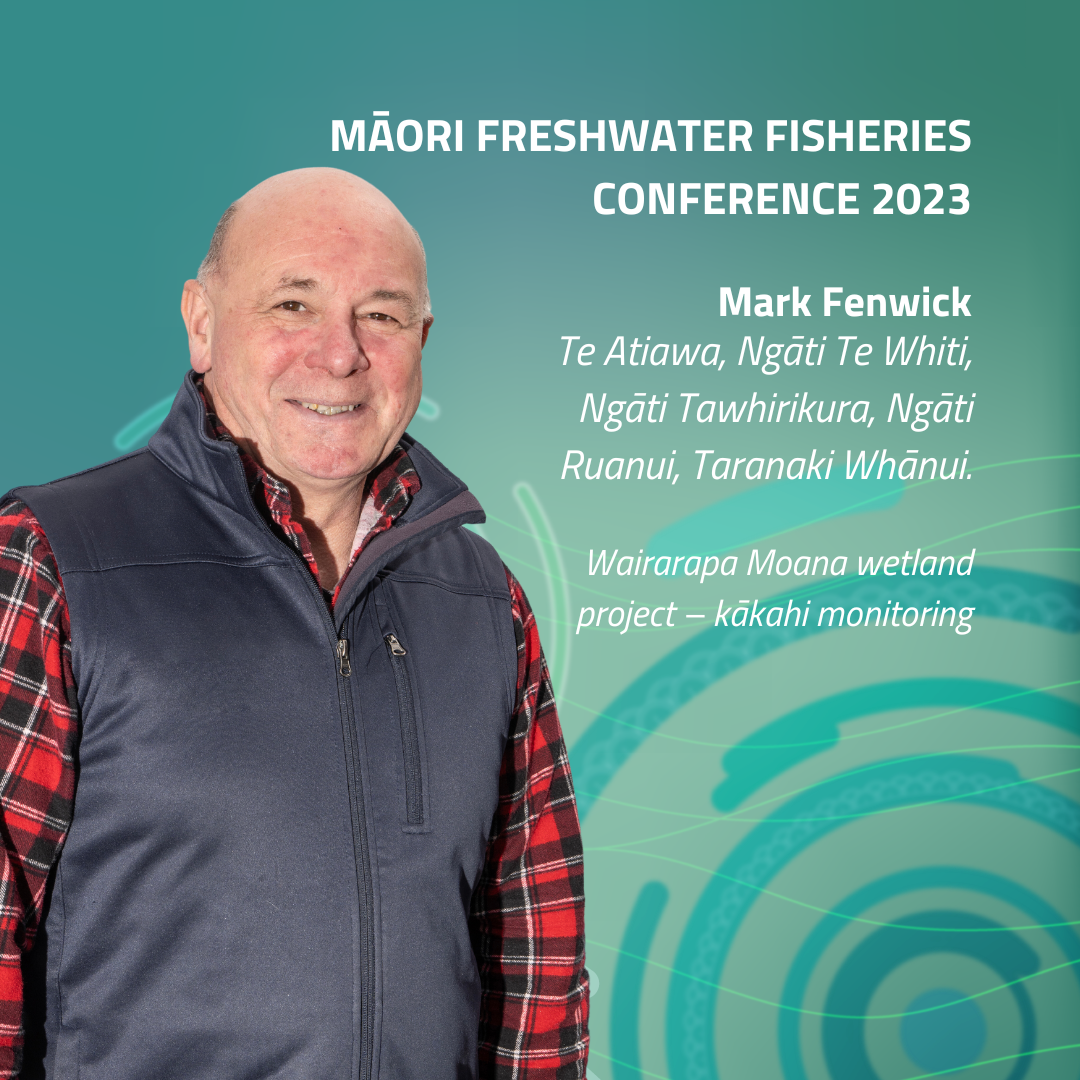
Mark Fenwick
Te Atiawa, Ngāti Te Whiti, Ngāti Tawhirikura, Ngāti Ruanui, Taranaki Whānui
Wairarapa Moana wetland project – kākahi monitoring
Mark is a marine and freshwater ecologist with NIWA. For over 20 years he has worked on kākahi taxonomy, biology and ecology, especially at Wairarapa Moana, a short drive from his wā kāinga, in Featherston.
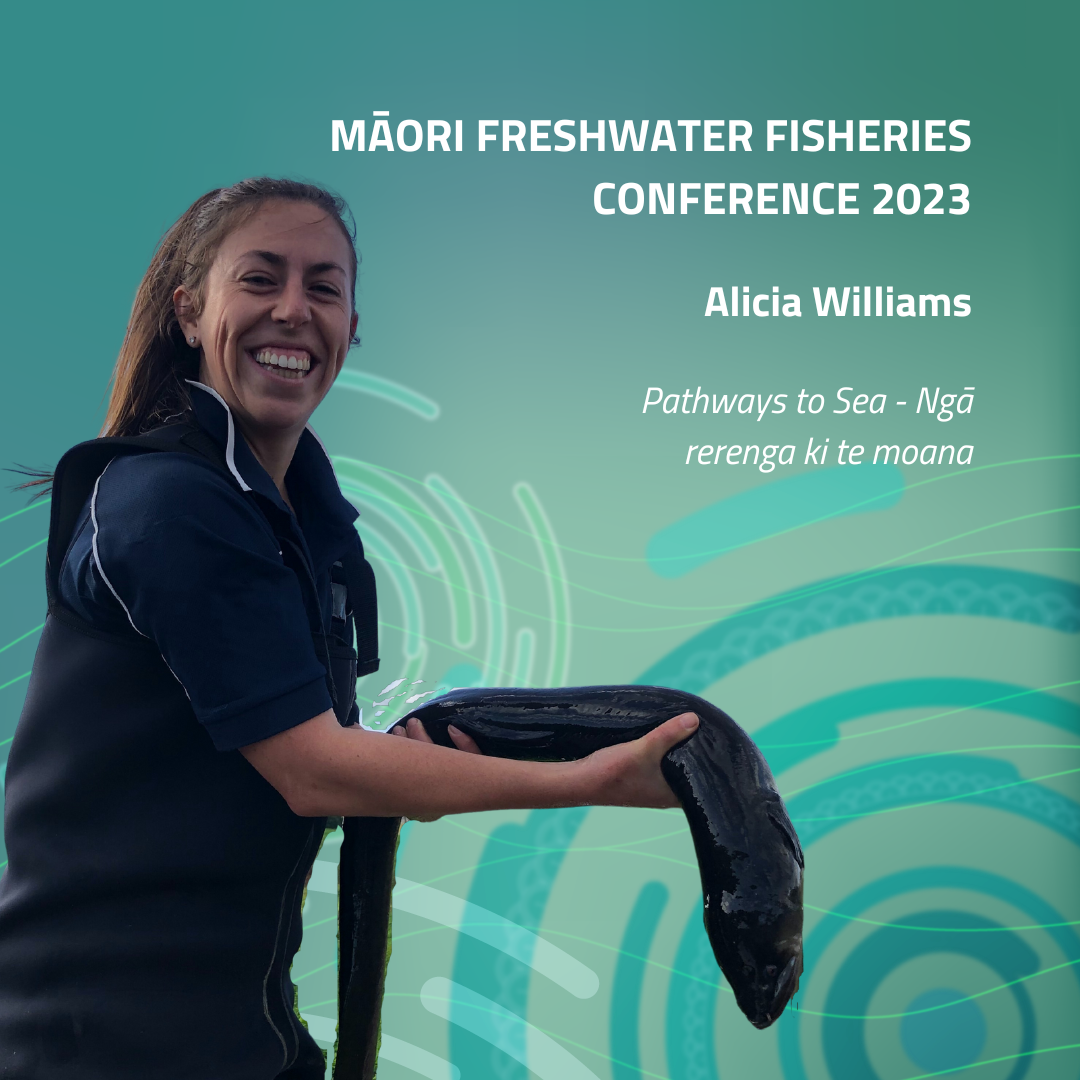
Alicia Williams
Pathways To The Sea – Ngā rerenga ki te moana
Alicia has 10 years’ experience, working in the freshwater ecology sector after completing her Masters (1st degree honours) at the University of Waikato where she focused on the feeding preferences of inanga in the lower Waikato River. Over this time, she has worked at both private consulting companies and in the public sector, where she is currently working as a Senior Freshwater Ecologist for Waikato Regional Council. Alicia’s main passions lie in the realm of freshwater fisheries, fish passage and large river restoration, with a large focus of late of improving downstream passage for tuna at infrastructure.
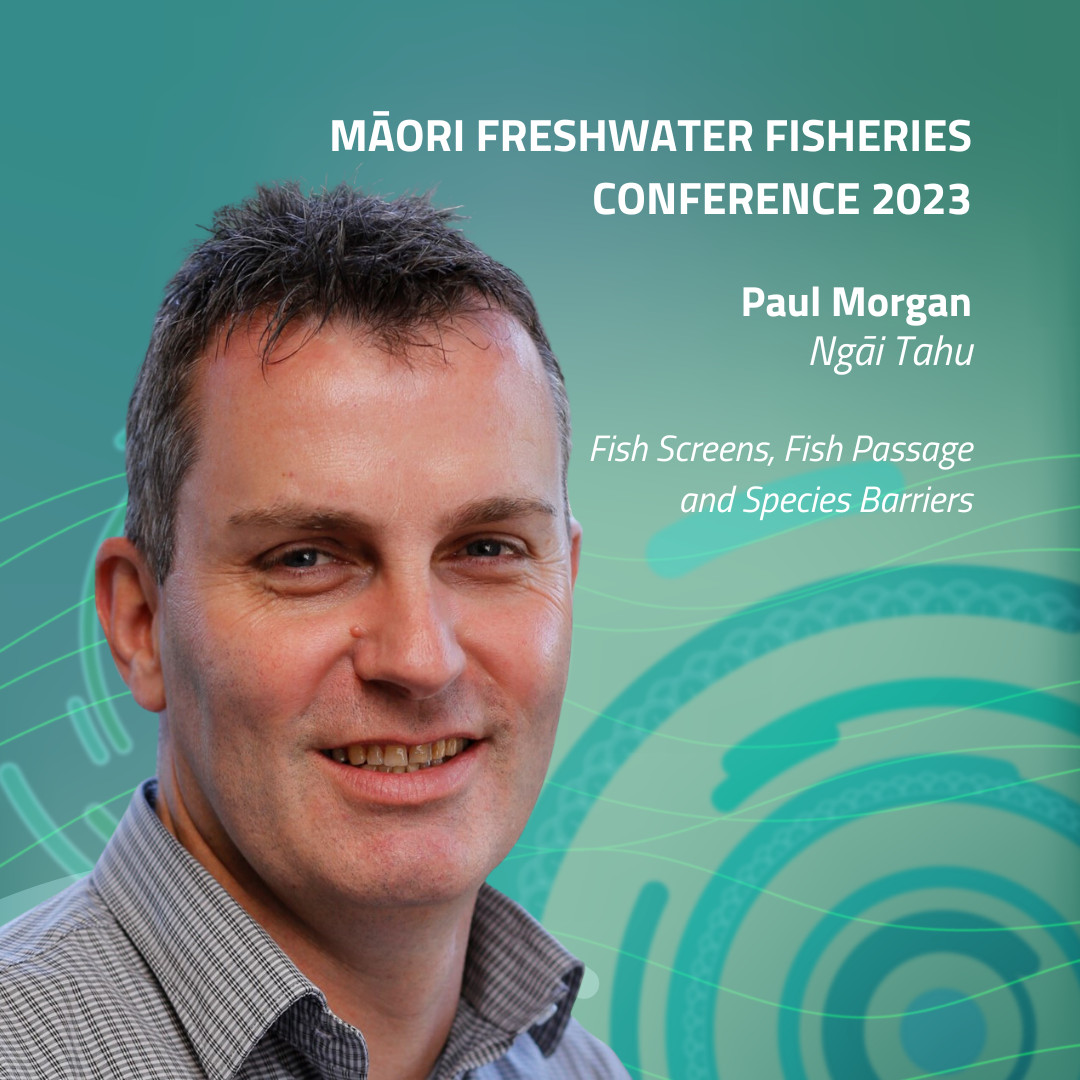
Paul Morgan
Ngāi Tahu
Fish Screens, Fish Passage and Species Barriers
Paul Morgan (Ngai Tahu) has over 25 years experience as an engineer working on a range of water projects in NZ and the UK in the areas of hydropower, irrigation, rivers and river intakes. Over the last 15 years he has worked on fish screen and fish passage projects and has also been on study tours to the USA and Australia, attended international conferences related to fish and attended many webinars about the protection of fish. He was the only Engineering Consultant on the Fish Screen Working Group based in Canterbury and has worked on over 50 fish screen sites including assessment of screens, consenting, design, construction and operation. He is one of the authors of the recent report for MPI entitled “Toward national guidance for fish screen facilities to ensure safe passage for freshwater fishes”.
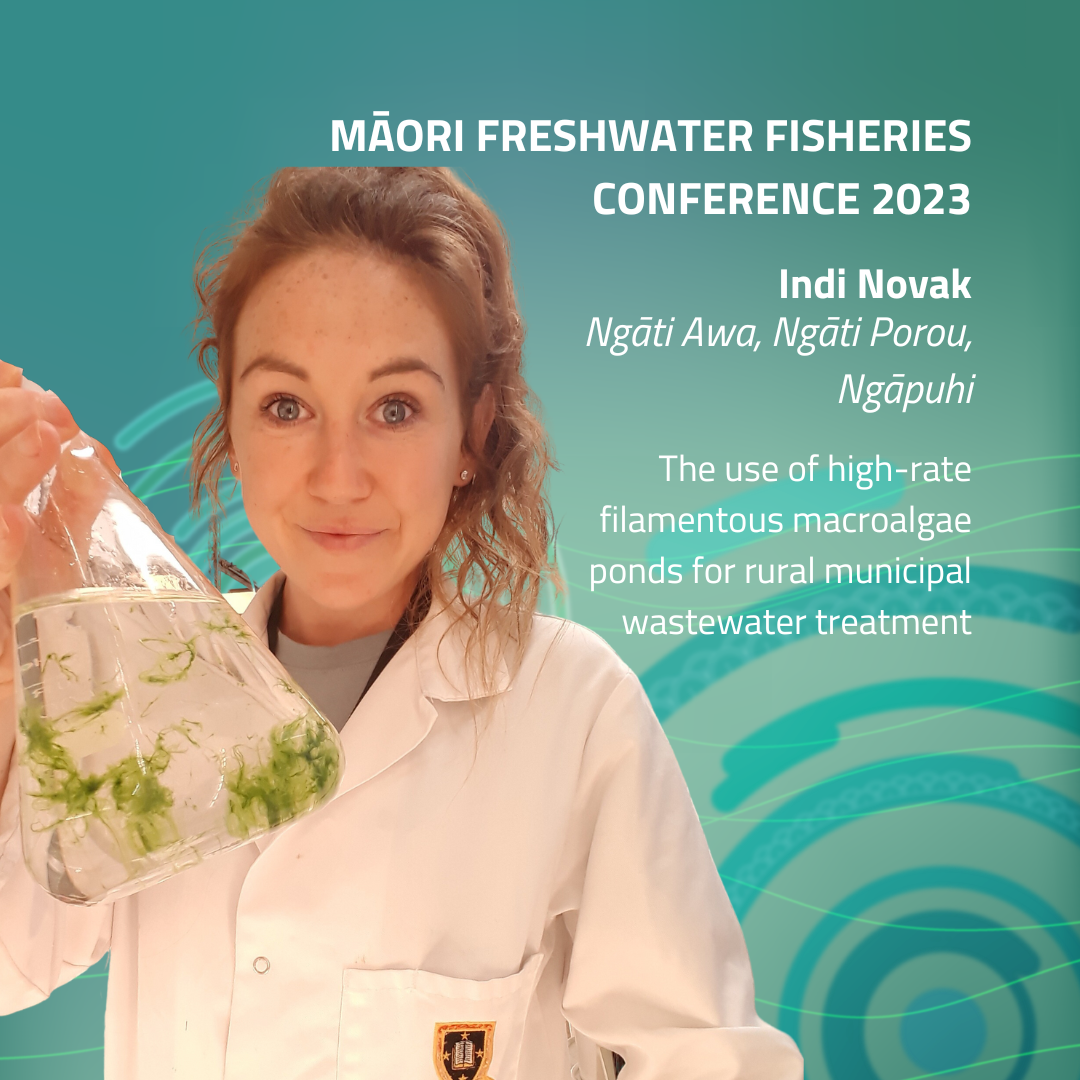
Indi Novak
Ngāti Awa, Ngāti Porou, Ngāpuhi
The use of high-rate filamentous macroalgae ponds for rural municipal wastewater treatment
Based at the Coastal Marine Field Station in Tauranga I am currently undertaking my PhD through Te Waiora: Joint Institute for Freshwater Management – University of Waikato and NIWA to develop innovative, effective, and eco-cultural wastewater treatment technologies. The purpose of my PhD research is to implement the use of high-rate filamentous macroalgae ponds to treat nutrients, human pathogens, and emerging contaminants in primary wastewater.
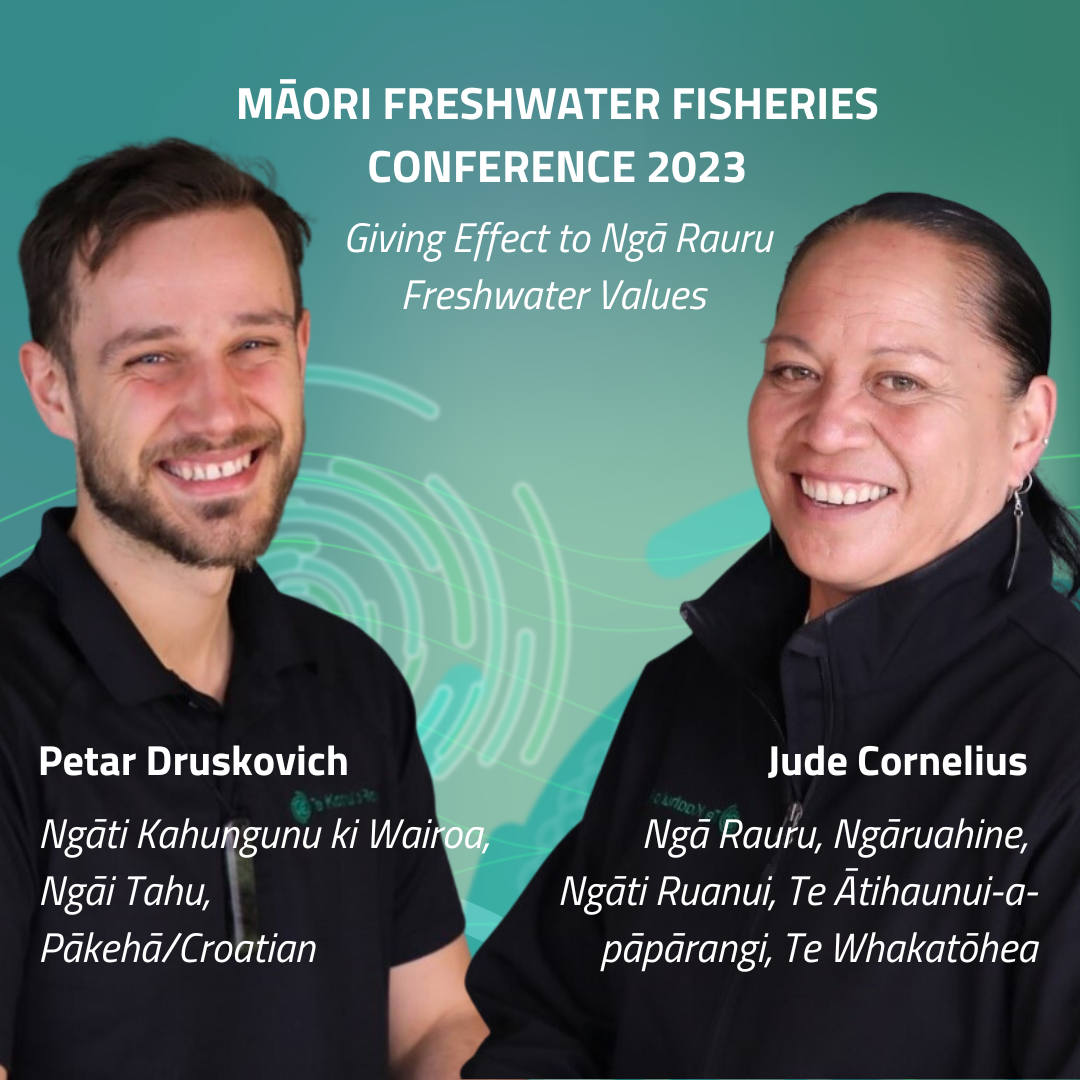
Petar Druskovich & Jude Cornelius
Ngāti Kahungunu ki Wairoa, Ngāi Tahu, Pākehā/Croatian & Ngā Rauru, Ngāruahine, Ngāti Ruanui, Te Ātihaunui-a-pāpārangi, Te Whakatōhea
Giving Effect to Ngā Rauru Freshwater Values
Petar is the Freshwater Scientist for Te Kāhui o Rauru. He has recently completed his MSc in Environmental Science, focusing on “giving effect” to Iwi/hapū values in freshwater monitoring and governance. His focus is developing monitoring approaches in line and reflective of this thinking.
Jude Cornelius serves as the Pou Taiao for Te Kāhui o Rauru, bringing over 20 years of experience in education and a range of Pūtaiao kaupapa. Jude’s primary focus is to nurture relationships that the Te Kāhui o Rauru Taiao Team hold, and to ensure that the values and aspirations of Ngā Rauru are at the core of all the work our rōpū undertakes.
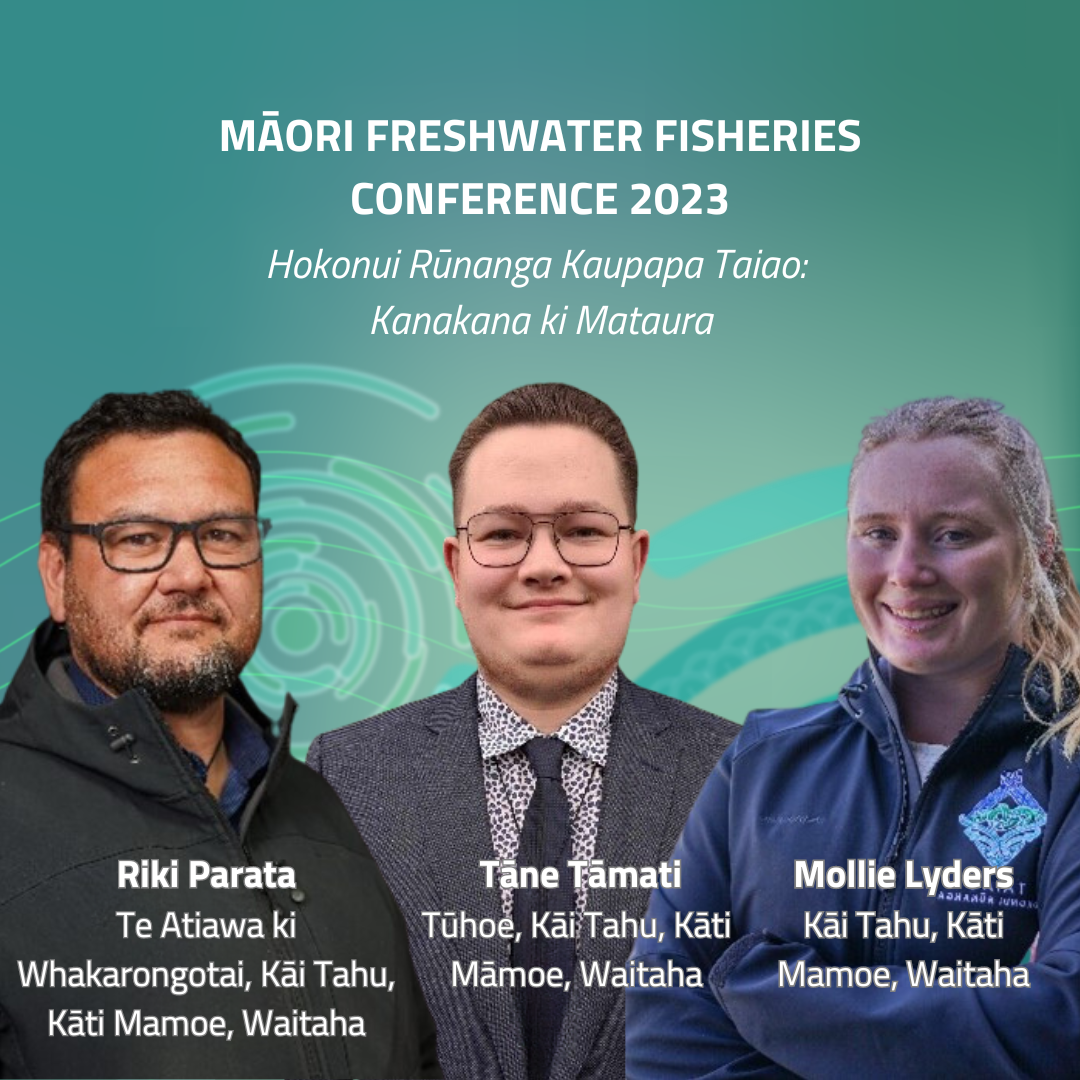
Riki Parata, Mollie Lyders, Tāne Tāmati
Te Atiawa ki Whakarongotai, Kāi Tahu, Kāti Mamoe, Waitaha; Tūhoe, Kāi Tahu, Kāti Māmoe, Waitaha; and Kāi Tahu, Kāti Mamoe, Waitaha
Hokonui Rūnanga Kaupapa Taiao: Kanakana ki Mataura
Riki Parata, Mollie Lyders, and Tāne Tāmati are kaimahi in the Wai-māori Rōpū at Hokonui Rūnanga Kaupapa Taiao (HRKT). They are kaitiaki for ngā awa, whenua, and ngahere in the Hokonui Rūnanga rohe, working principally within the Mataura Catchment, based in Gore, Southland.
Riki holds a MSc in Environmental Science and is interested in weaving mātauranga Māori and science disciplines, managing the Wai-māori Rōpū as Kaiārihi Taiao at HRKT. Mollie comes from an Environmental Planning and Policy background and focuses on incorporating mahinga kai and kaitiakitanga, from practice to policy. Tāne holds a BSc in Geoscience and Archaeology from the University of Otago and is interested in kaupapa Māori research, working as Kaitohutohu Taiao at HRKT.
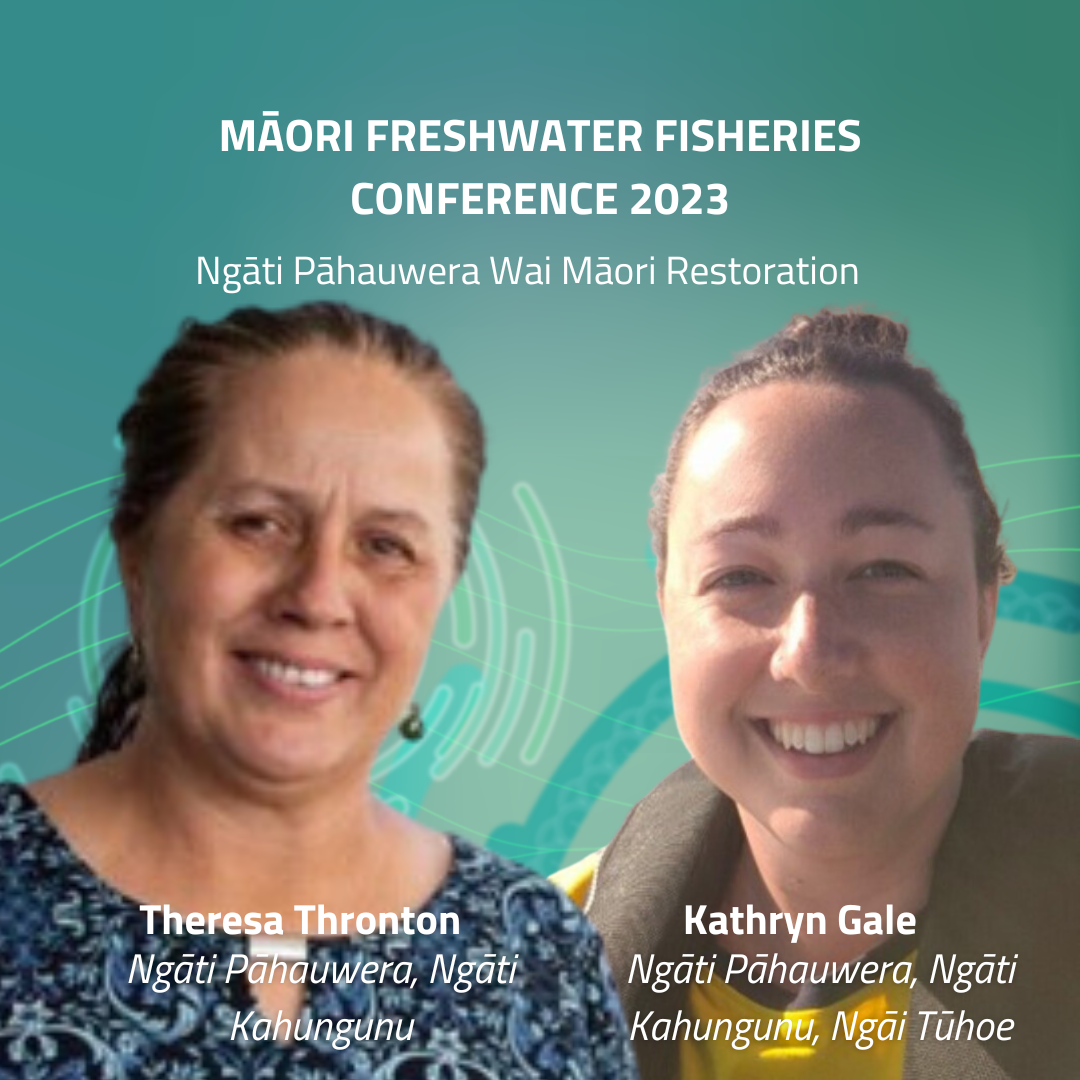
Theresa Thornton and Kathryn Gale
Ngāti Pāhauwera, Ngāti Kahungunu; & Ngāti Pāhauwera, Ngāti Kahungunu, Ngāi Tūhoe
Ngāti Pāhauwera Wai Māori Restoration
Theresa and Kathryn are descendants of Ngāti Pāhauwera – Theresa is a trustee for the Ngāti Pāhauwera Development Trust, and Kathryn is a staff member managing taiao work.
Ngāti Pāhauwera have been working to protect and restore the environment across our rohe, and our kōrero covers what we have learned over years working in this space across different aspects of wai Māori. These include: providing safe drinking water for rural communities; ngutukaka restoration; monitoring and restoring kākahi and waikōura populations and; managing hornwort in lakes.
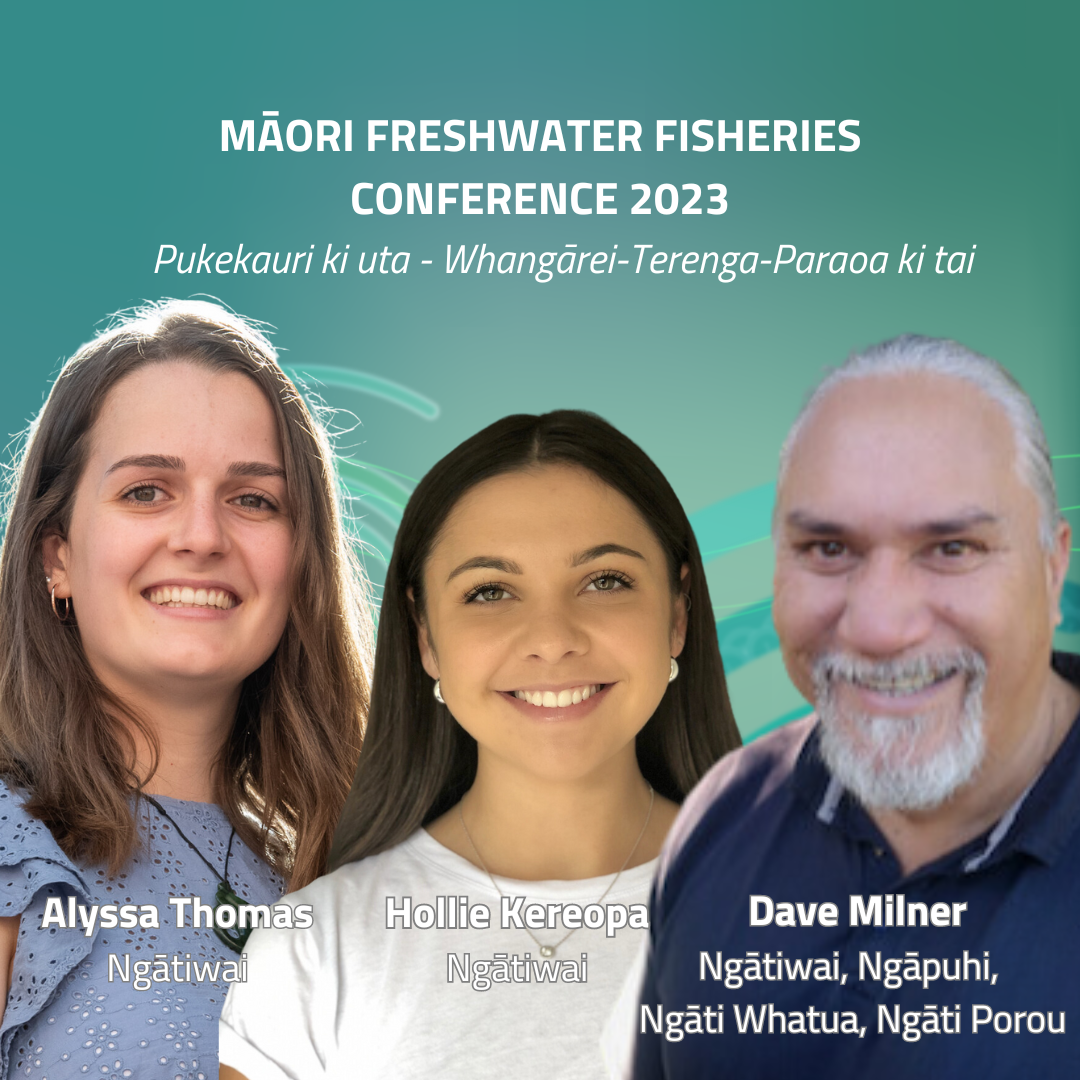
Alyssa Thomas, Hollie Kereopa and Dave Milner
Ngātiwai; Ngātiwai; and Ngātiwai, Ngāpuhi, Ngāti Whatua, Ngāti Porou
Pukekauri ki uta – Whangārei-Terenga-Paraoa ki tai
Dave, Hollie and Alyssa are kaimahi of the Pou Taiao Unit for Patuharakeke Te Iwi Trust Board. We are kaitiaki for ngā awa, whenua, moana, and ngahere in Patuharakeke rohe.
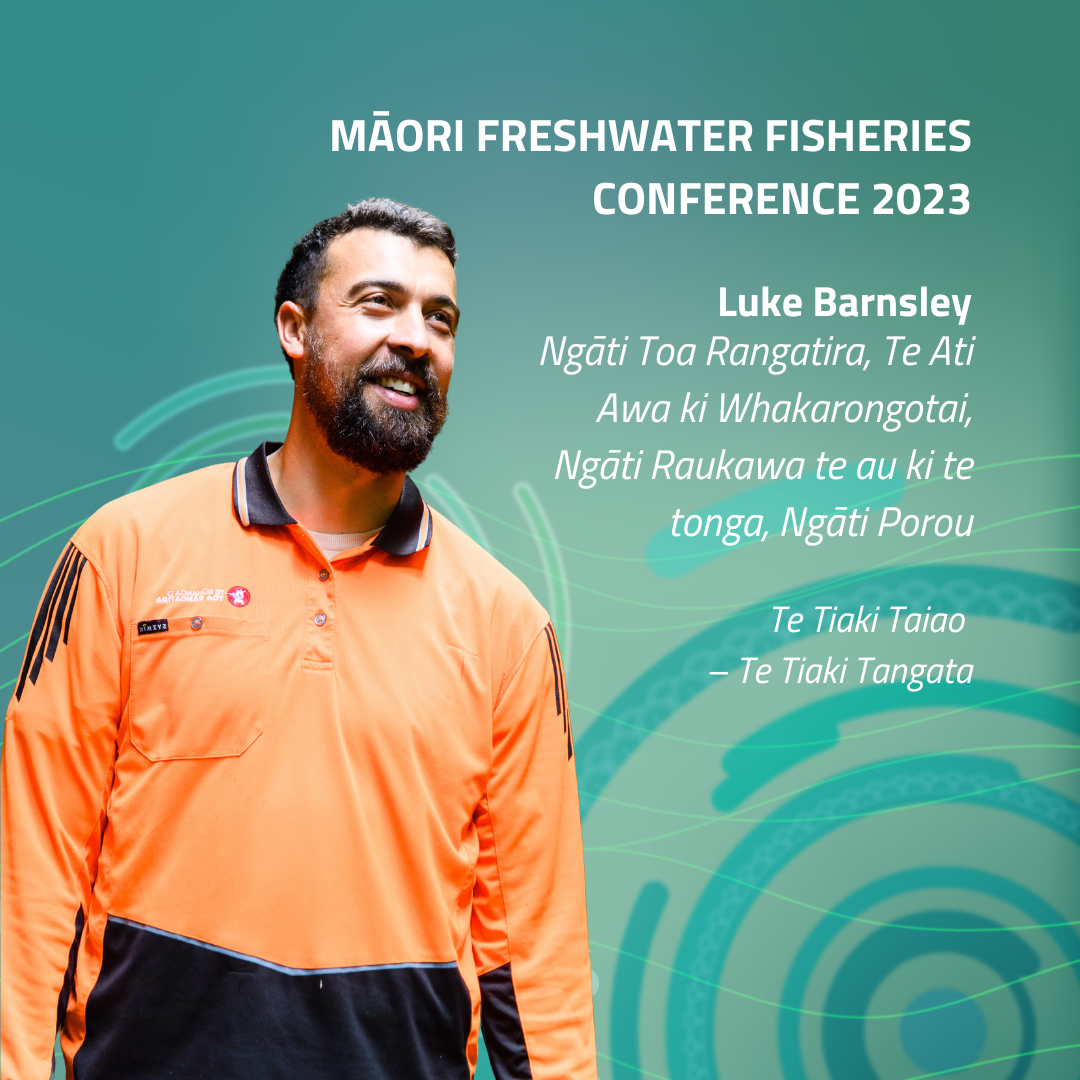
Luke Barnsley
Ngāti Toa Rangatira, Te Ati Awa ki Whakarongotai, Ngāti Raukawa te au ki te tonga, Ngāti Porou
Te Tiaki Taiao – Te Tiaki Tangata
Luke is a kaimahi for the Ahurea Taiao group of Ngāti Toa which is dedicated to active protection and stewardship of its streams, harbours, whenua and oceans. Luke believes that by having the ability to utilise matauranga and western knowledge systems iwi māori are uniquely placed to be the most proficient managers of our taiao. Ahurea Taiao group aim is to set all projects up to support the capacity building of uri whakaheke so they are empowered to be active managers of their whenua and moana for generations to come, so we can continue to strengthen our ability to uphold our obligation to Te Taiao. This kōrero will focus on a few such projects related to wai māori that help to build that capcaity as well as protect and inform mahinga kai practice and stream health.
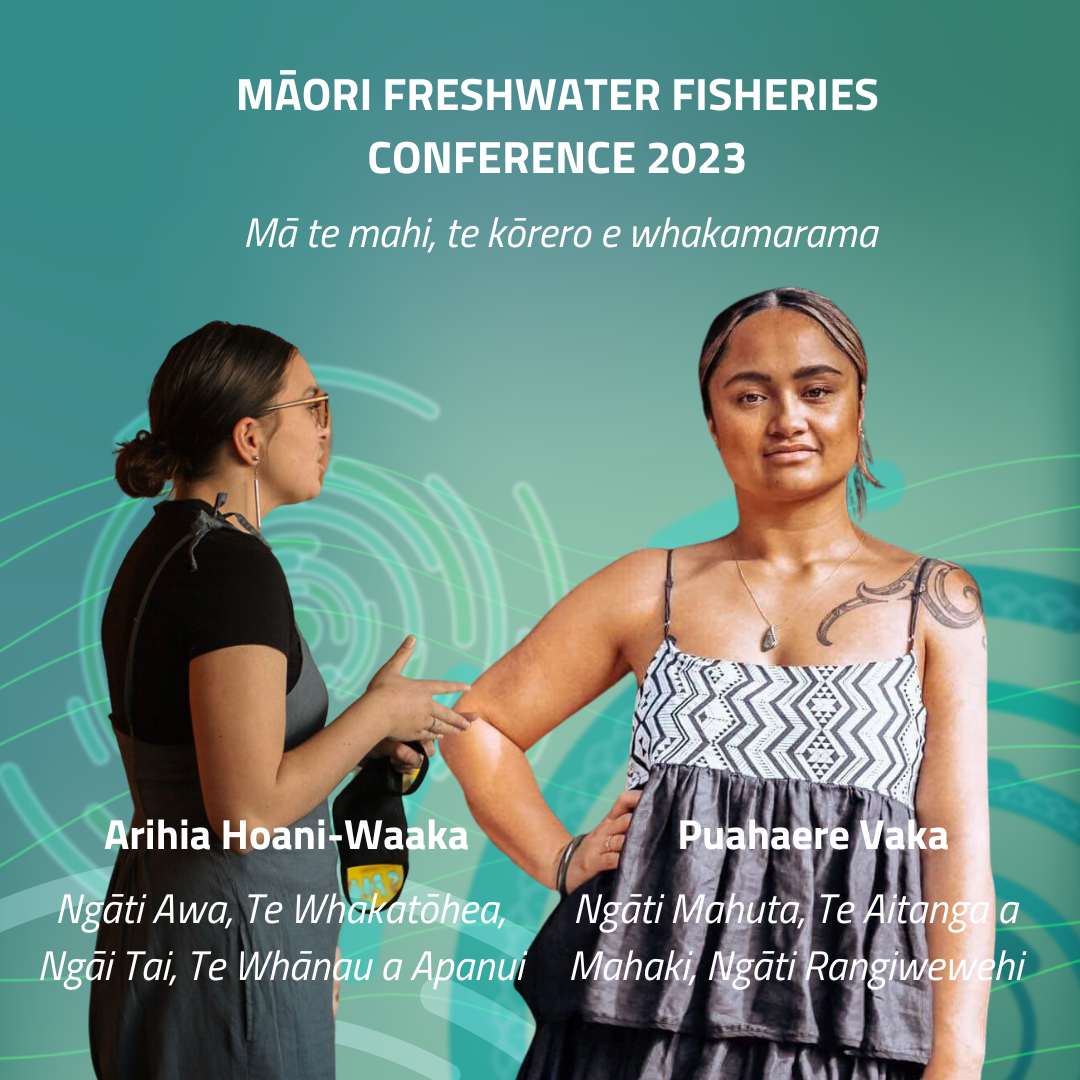
Arihia Hoani-Waaka & Puahaere Vaka
Ngāti Awa, Te Whakatōhea, Ngāi Tai, Te Whānau a Apanui & Ngāti Mahuta, Te Aitanga a Mahaki me Ngāti Rangiwewehi
Mā te mahi, te kōrero e whakamarama
Puahaere Vaka
Ko Puahaere Vaka tōku ingoa, nō Ngāti Mahuta, Te Aitanga a Mahaki me Ngāti Rangiwewehi. My life’s journey intertwines a deep passion for Kapa Haka with a commitment to Taiao projects. Recently I have been fortunate to contribute to initiatives such as Te Mana o Te Wai Training Development, Te Hira Pū-Ao and Te Mana o Te Wai Research. My academic background includes a Law Degree, while my professional expertise centres on Governance, Policy, and Māori Economic Development. Focussed on the future of our tamariki/mokopuna in all spheres Wai Māori is another critical avenue to drive succession.
Arihia Hoani-Waaka
Ko Ngāti Awa, ko Te Whakatōhea, ko Ngāi Tai, ko Te Whānau a Apanui ngā iwi, ko Arihia Hoani-Waaka tēnei. Arihia is sponge learner who has been championed in sink or swim manner providing life shaping wheako… Specialising in iwi and hapū centric project management and providing technical support to iwi and hapū, particularly related to water, government policy, legislative change and advocacy, she is passionate about the realms we create for the next generations success. Through this line of work she has contributed to numerous water related kaupapa including the co-development of a Te Mana o Te Wai Training Programme, researching a Te Mana o Te Wai-centered National Objective Framework process, holding the pen on a Taiao-centric Food Standard and sharing a leadership role in Te Hira Pū-ao.
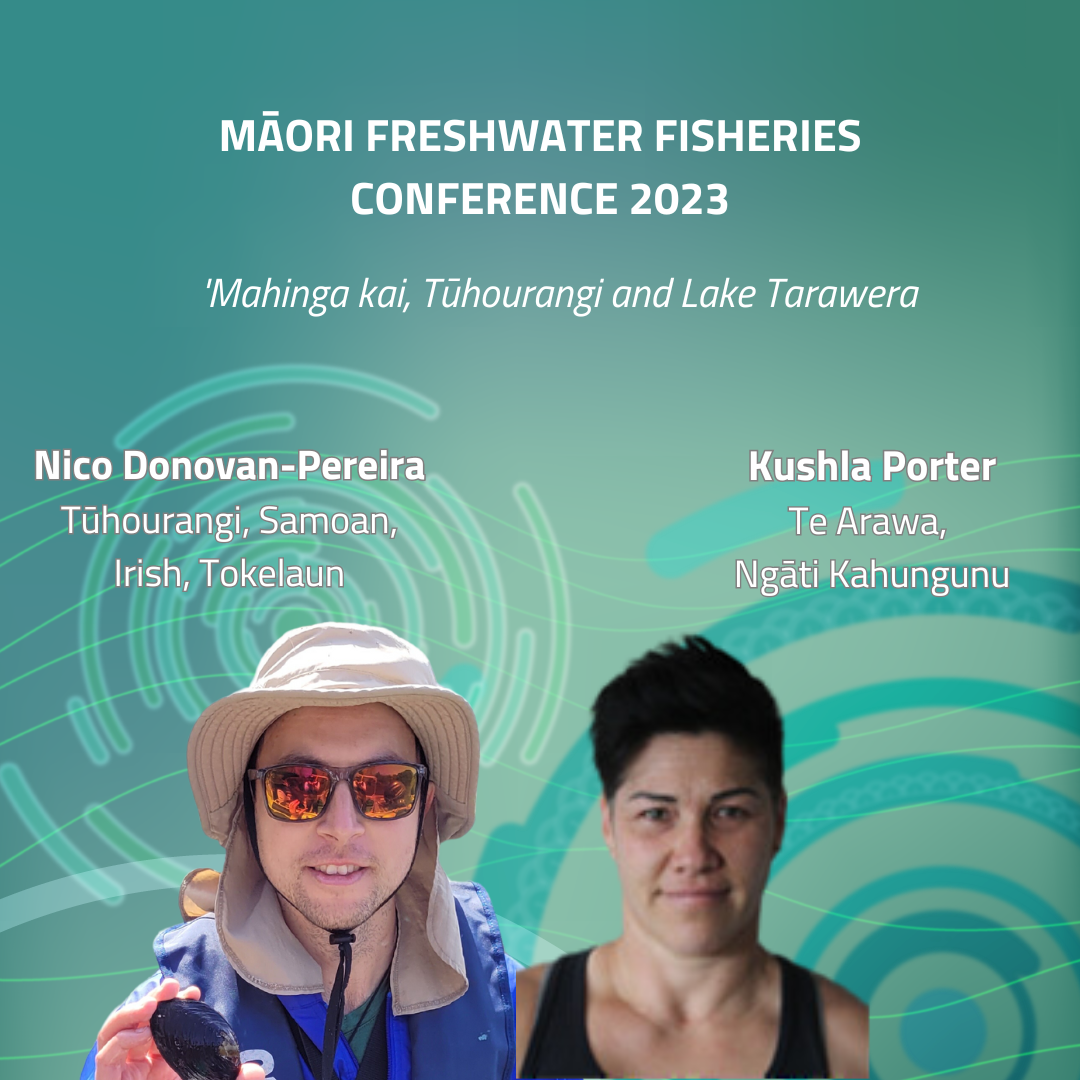
Kushla Porter and Nico Donovan-Pereira
Te Arawa, Ngāti Kahungunu & Tūhourangi, Samoan, Irish, Tokelaun
Mahinga kai, Tūhourangi and Lake Tarawera
Kushla Porter will complete her studies at Toi Ohomai Institute of Technology|Te Pukenga this November, obtaining her Bachelors Degree in Applied Business Management. Her whakapapa includes both Te Arawa and Ngati Kahungunu iwi. Her current research projects include exploring the viability of Tiny Homes to sustain whanau needs; Healthcare inequalities, particularly amongst indigenous populations; and Influences impacting Maori ability to mahi Kai. Her most recent completed study explored the sustainability of Tuna and Koura in Lake Tarawera to feed Tuhourangi whanau. Her future plans include exploring research opportunities that will positively impact Maori
Nico Donovan-Pereira (Tūhourangi, Samoan, Irish, Tokelaun) is a PhD candidate at the University of Waikato. His rangahau looks at how whanau can reconnect to their whakapapa and taiao. His rangahau is on Kākahi and Lake Tarawera as a case study for Mātauranga informed freshwater management through the lens of mahinga kai.
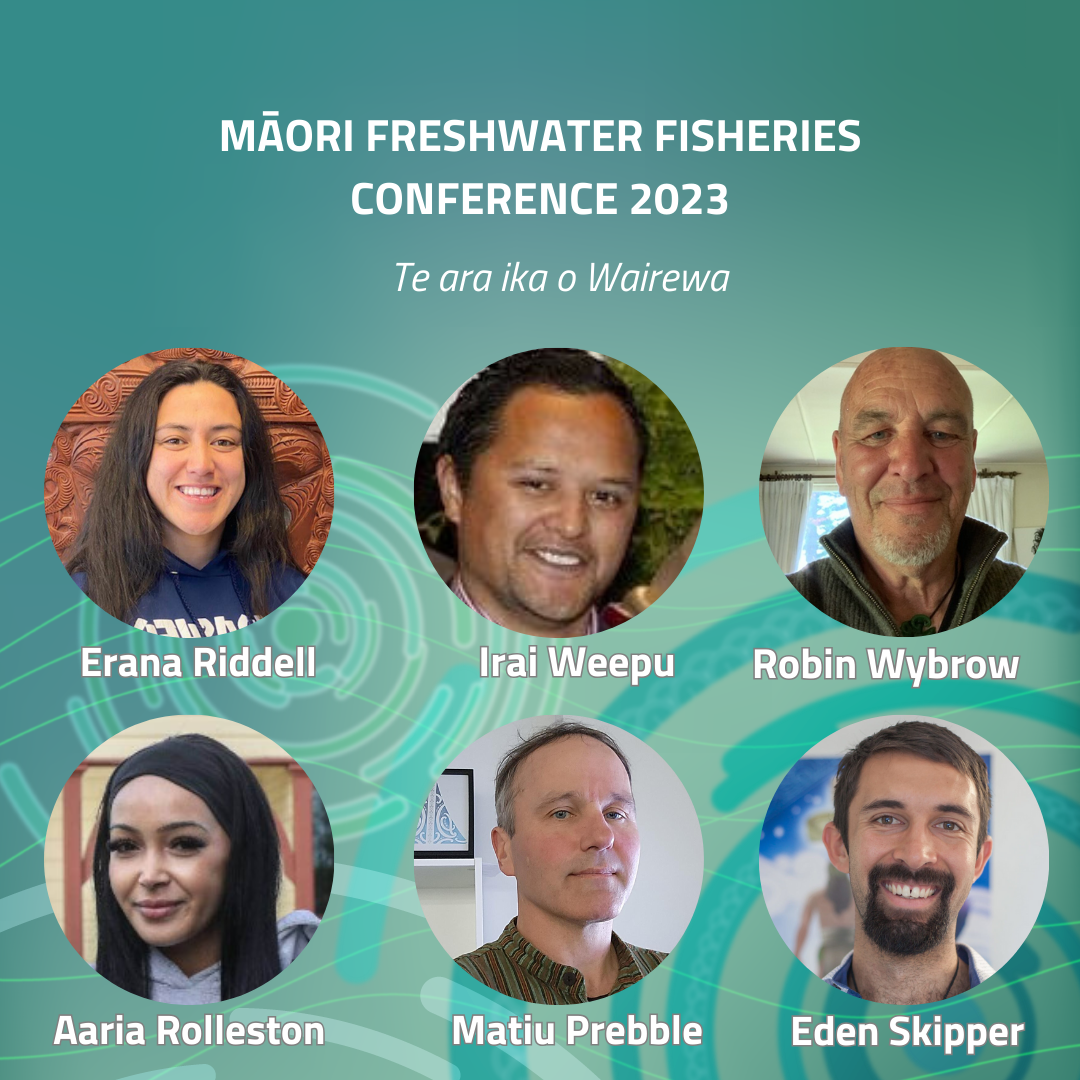
Te Ao Tūroa ki Wairewa Rūnanga
Te Ara Ika o Wairewa
There is a roopu speaking to this kaupapa.
Robin Wybrow, Pou Tiamana, Rūnanga Executive, Tangata Tiaki Wairewa ā Te Kaiō Mātaitai
Erana Riddell, Project Coordinator Tāwhaki Joint Venture, Tangata Tiaki Te Kaiō Mātaitai.
Aaria Rolleston, Kotahi Mano Kāika, He Waka Kōtuia Trust
Irai Weepu, Environment Canterbury, Tangata Whenua Facilitator, Tangata Tiaki Te Kaiō Mātaitai
Eden Skipper, MPI Special Advisor in Māori Capability, Biological Heritage, National Science Challenge, Tangata Tiaki Te Kaiō Mātaitai
Matiu Prebble, Te Kete o Wairewa Director, Te Kahu o Te Kaiō Steering Kōmiti, Te Riaka Aka Matua Tāwhaki Joint Venture, Tangata Tiaki Te Kaiō Mātaitai
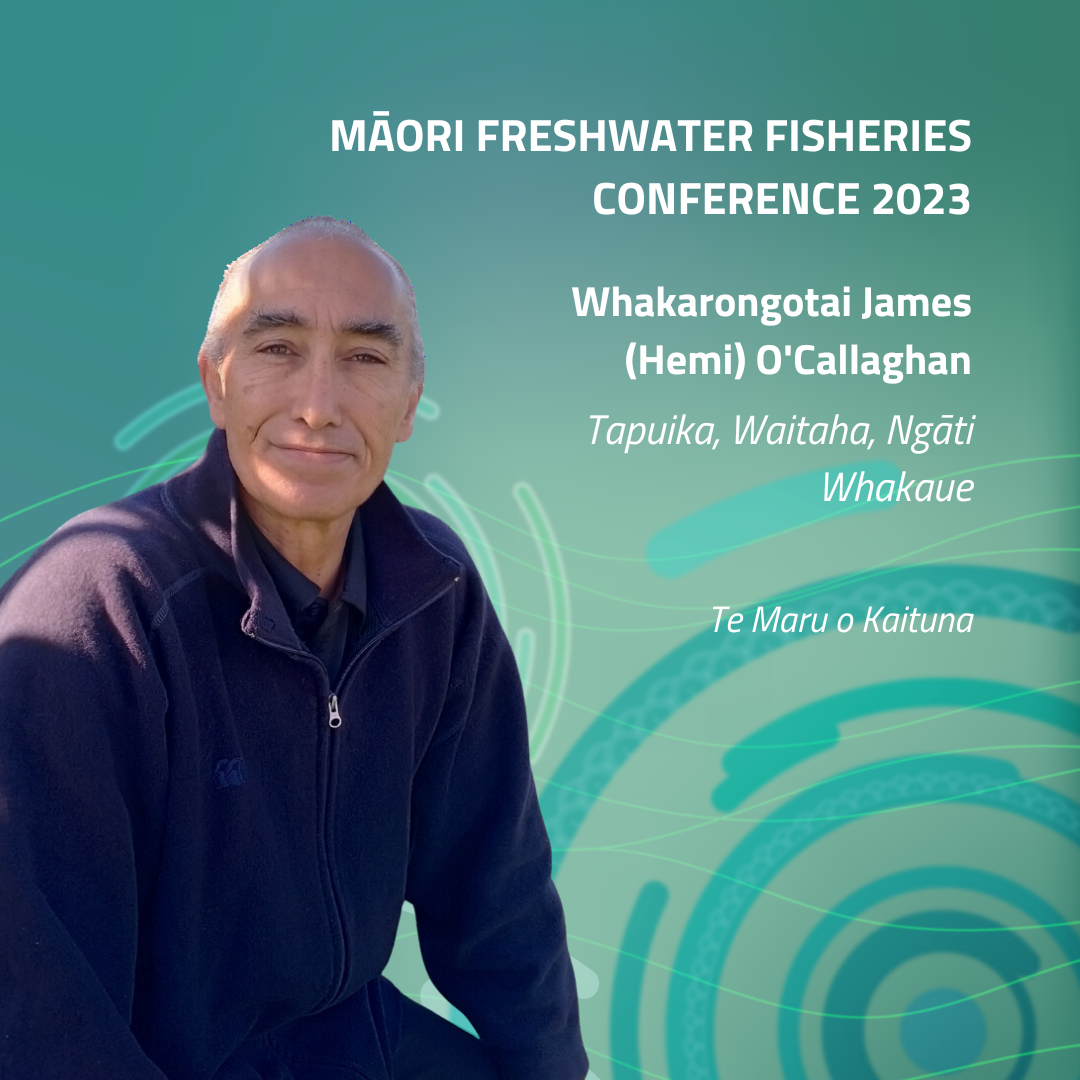
Whakarongotai James (Hemi) O’Callaghan
Tapuika, Waitaha, Ngāti Whakaue
Te Maru o Kaituna
Whakarongotai James (Hemi) O’Callaghan is an environmental educator and māramataka practitioner, who is passionate about the taiao and his people. He strives to ensure that all mahi is grounded in tikanga; kawa and kaitiakitanga and results in better outcomes mō ngā mokopuna o āpōpō. Hemi is the Research Lead of the Pātaka Kai Project on behalf of Te Maru o Kaituna River Authority.
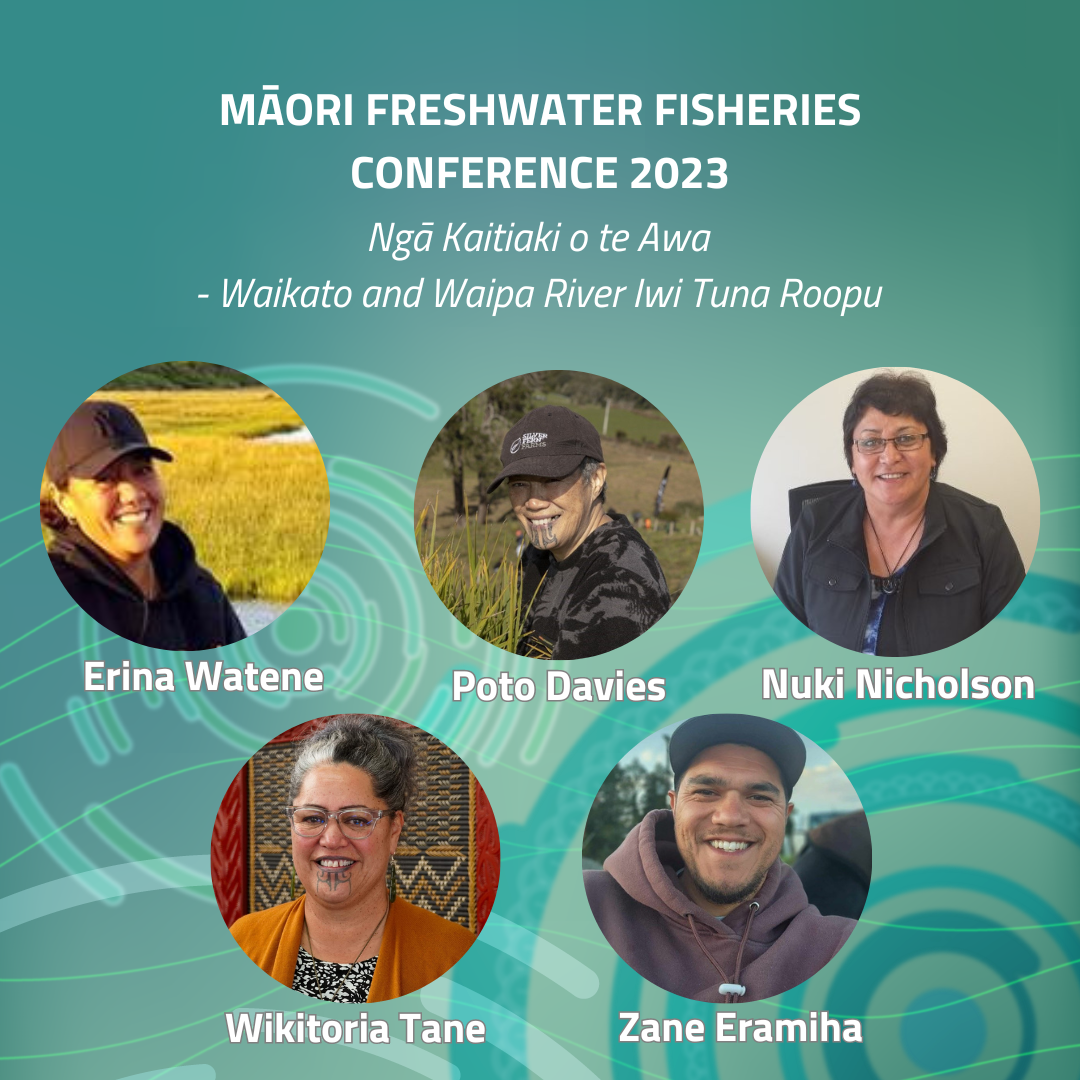
Ngā Kaitiaki o te Awa – Waikato and Waipa River Iwi Tuna Roopu
Erina Watene (Waikato-Tainui, Ngaati Maahanga, Ngai te Rangi); Wikitoria Tane (Ngāti Maniapoto); Zane Eramiha (Ngati Koroki Kahukura Kaitiaki); and Nuki Nicholson (Te Arawa River Iwi Trust) are part of the Waikato and Waipa River Tuna Iwi Collective.
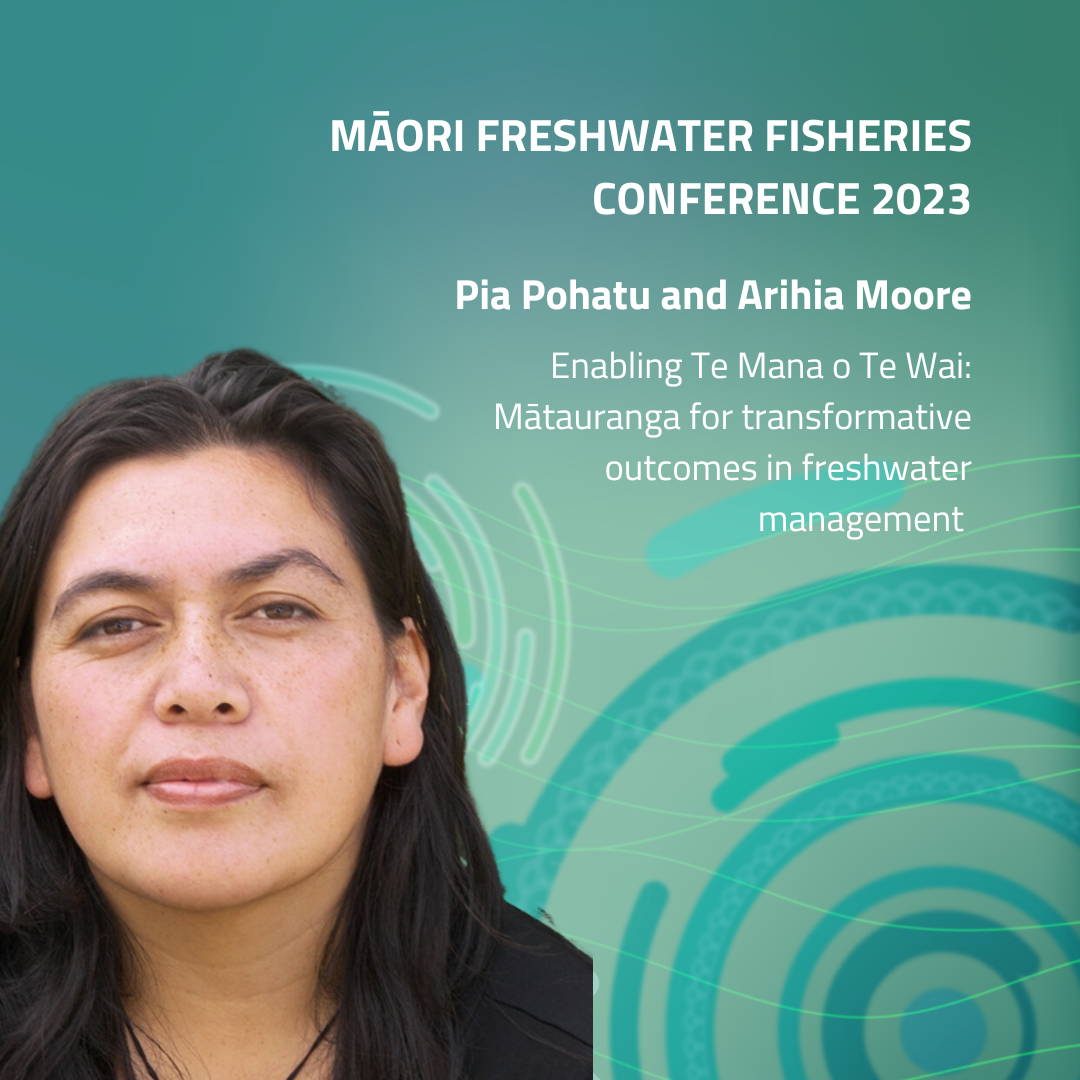
Pia Pohatu and Arihia Moore
Enabling Te Mana o Te Wai: Mātauranga for transformative outcomes in freshwater management
Pia and Arihia will share insights and learnings from partnering with mana whenua (hapū and landowners) in their understandings of and their considerations for enabling Te Mana o Te Wai within their wai, whenua, whānau, hapū and iwi.
Key learnings focus on the application of mātauranga in freshwater management by hapū and Māori landowners, navigating the National Objectives Framework (NOF) process, monitoring approaches and use of cultural health assessment tools and engaging and influencing council/s and other stakeholders.
